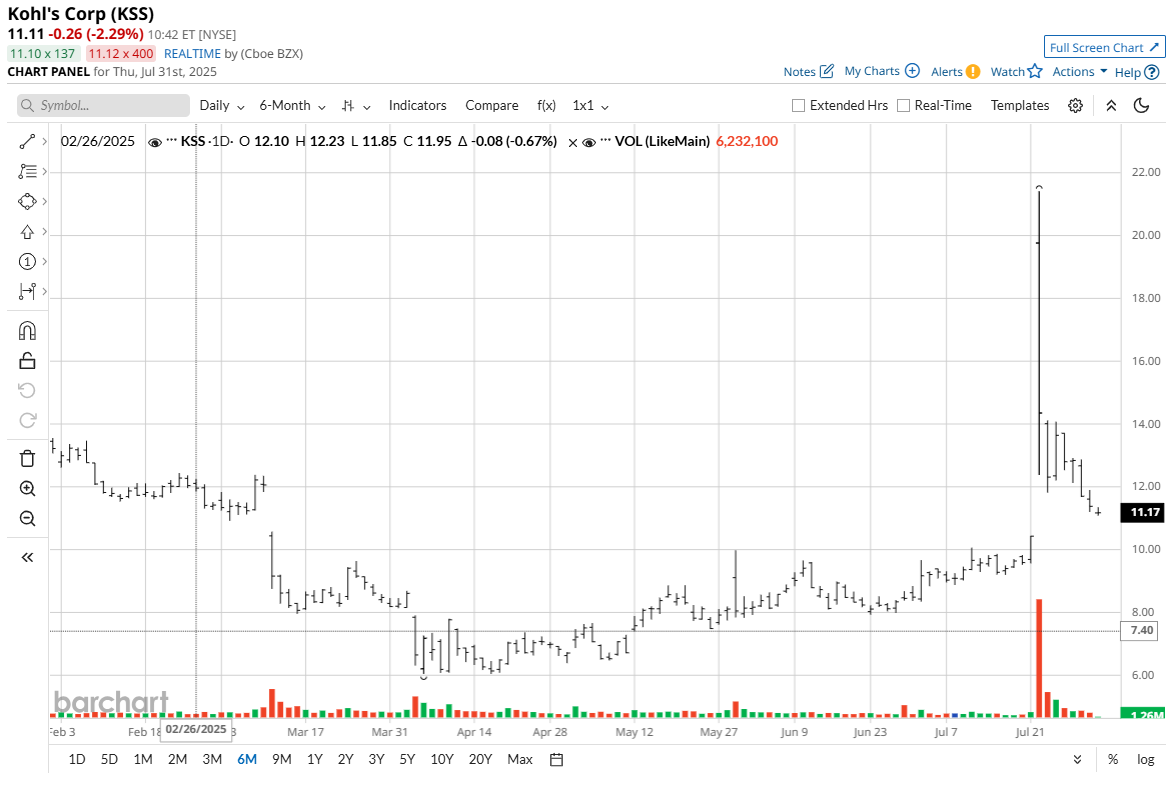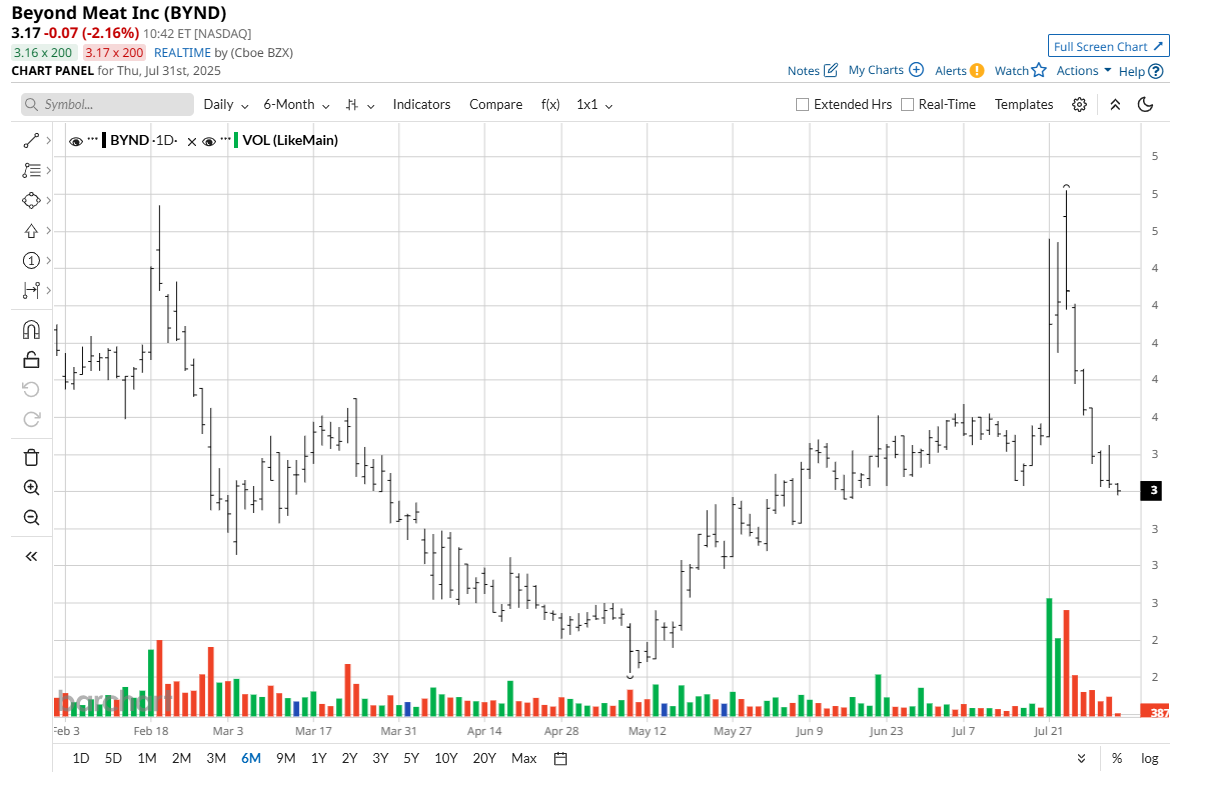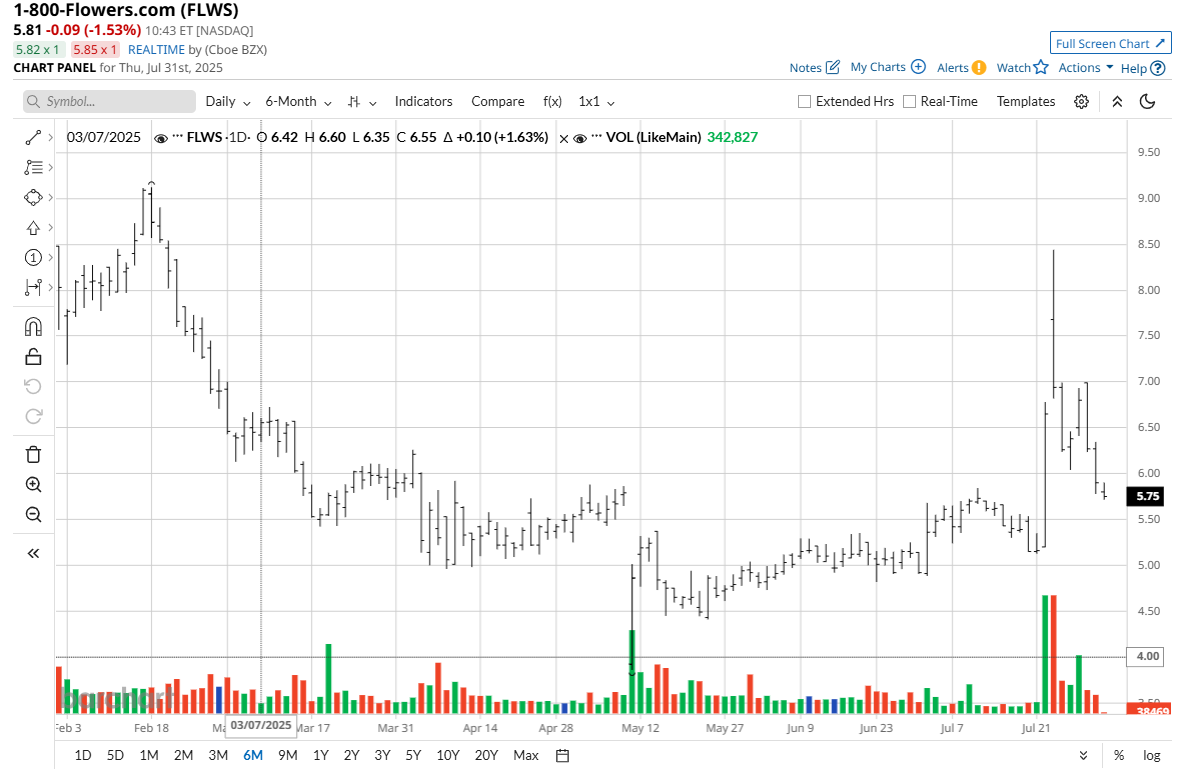
A new meme stock rally has emerged, potentially surpassing the 2021 craze in scale, according to WallStreetBets founder Jaime Rogozinski. Struggling retailers and consumer brands, such as Kohl’s (KSS), GoPro (GPRO), and Krispy Kreme (DNUT) surged last week, apparently driven by retail investors mobilizing online. American Eagle (AEO) stock jumped 10% after announcing Sydney Sweeney as a brand ambassador, exemplifying how celebrity endorsements now drive trading.
Meme stock traders often disregard fundamentals, instead supporting brands based on emotional or ideological reasons. For example, Trump Media (DJT) is valued at $4 billion yet generates just $1 million in quarterly revenue.
If you are looking for more meme mania, here are three consumer brands that could rally from current levels, given that they are highly shorted.
Meme Stock #1: Kohl’s
Kohl’s stock erupted last Tuesday, surging as much as 105% in early trading before closing 37% higher on July 22 at $14.34.

The surge appears to be driven primarily by social media hype rather than fundamental factors. With nearly 45% of Kohl's float sold short, it became a prime target for retail traders seeking to trigger a short squeeze. Trading was temporarily halted due to extreme volatility as the stock oscillated wildly between gains and losses.
Kohl’s business remains troubled despite the stock euphoria. Its Q1 earnings call revealed ongoing challenges, with comparable sales declining 3.9% and leadership instability following the termination of CEO Ashley Buchanan.
Market experts warn that meme stock rallies typically see companies collapse back to pre-surge levels once the frenzy subsides, making ongoing gains unlikely.
Out of the 12 analysts covering KSS stock, six recommend “Hold,” one recommends “Moderate Sell,” and five recommend “Strong Sell.” The average stock price target for KSS stock is $7.69, 32% below the current price.
Meme Stock #2: Beyond Meat

Down almost 99% from its all-time highs, Beyond Meat (BYND) stock has nearly 40% of its float sold short and may be on the watchlist of meme stock traders. In Q1, Beyond Meat reported sales of $68.7 million, down more than 9% year over year amid challenges in the plant-based meat category. It posted a gross loss of $1.1 million, marking a sharp reversal from the $3.7 million profit achieved in the same period last year.
Volume decreased 11.2% year-over-year, driven by weak demand in U.S. retail and foodservice channels, distribution losses as retailers moved products from refrigerated to frozen sections, and broader macroeconomic pressures affecting consumer spending. CEO Ethan Brown acknowledged this represented “a deviation from the previous 2 quarters,” when the company had shown signs of recovery.
Moreover, Beyond Meat withdrew its full-year guidance, citing elevated uncertainty.
Despite operational challenges, Brown remains focused on cost reduction and improving consumer perception through new marketing campaigns, emphasizing a commitment to profitability over growth.
Out of the eight analysts covering BYND stock, four recommend “Hold” and four recommend “Strong Sell.” The average target price for BYND stock is $2.71, 16% below the current price.
Meme Stock #3: 1-800 Flowers

The final meme stock on the list is 1-800 Flowers (FLWS), which has nearly 73% of its float sold short. Two analysts cover FLWS stock, with one recommending a “Strong Buy” and the other recommending a “Hold.” The average target price for FLWS stock is $8.50, 44% above the current price.
1-800-Flowers delivered a massive Q3 earnings miss, posting a loss of $0.71 per share against analyst expectations for a loss of $0.34, while revenue plunged 12.6% to $331.5 million. CEO Jim McCann acknowledged significant self-inflicted wounds, particularly a “colossal screw up” with the company’s order management system implementation that cost $11 million over two quarters and disrupted customer service during the critical holiday period. The Consumer Floral and Gifts segment declined 11.4%, while Gourmet Foods plummeted 18.2%.
In response to these challenges, the company unveiled its ambitious “Celebrations Wave” strategy, representing what McCann called their “sixth wave of innovation.” The initiative aims to create a comprehensive celebrations ecosystem using AI and personalized experiences to reduce customer acquisition costs and increase engagement.
The company withdrew full-year guidance amid macroeconomic uncertainty and rising marketing costs, with net debt jumping to $75 million from $9 million year-over-year, highlighting the urgent need for a strategic overhaul.






